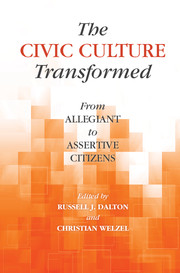Book contents
- Frontmatter
- Dedication
- Contents
- List of Figures
- List of Tables
- Contributors
- Foreword
- Preface and Acknowledgments
- 1 Political Culture and Value Change
- Part A Changing Values
- Part B Changing Images of Government
- 5 Reassessing the Civic Culture Model
- 6 Dissatisfied Democrats
- 7 Support for Democracy in Postcommunist Europe and Post-Soviet Eurasia
- Part C The Impact of Cultural Change
- References
- Index
6 - Dissatisfied Democrats
Democratic Maturation in Old and New Democracies1
Published online by Cambridge University Press: 05 January 2015
- Frontmatter
- Dedication
- Contents
- List of Figures
- List of Tables
- Contributors
- Foreword
- Preface and Acknowledgments
- 1 Political Culture and Value Change
- Part A Changing Values
- Part B Changing Images of Government
- 5 Reassessing the Civic Culture Model
- 6 Dissatisfied Democrats
- 7 Support for Democracy in Postcommunist Europe and Post-Soviet Eurasia
- Part C The Impact of Cultural Change
- References
- Index
Summary
From the beginning, political culture research has argued that, to persist, democracies need a supportive public (Almond and Verba 1963, Chapter 12). Recent evidence, however, indicates a change in the nature of democratic political culture. While support for democracy as a principle is widespread, many citizens have become less satisfied with the way democracy performs (Klingemann 1999; Dalton 2004). Norris (1999, 2010) characterizes this discrepancy as the rise of the “critical citizen.” This term implies a positive message: Critical citizens improve the quality of the democratic process. This chapter shows whether this optimistic perspective is empirically justified in Europe.
The possible combination of principled support for democracy with dissatisfaction about its performance has been anticipated by Easton (1965; 1975), who called for an analytical distinction between support for a political regime and support for its specific institutions and the authorities running them. Cross-national evidence shows that contemporary citizens do indeed make this distinction (Klingemann 1999; Dalton 1999). People who support democracy as a form of government can either be satisfied or dissatisfied with the design of political institutions and the performance of the political actors of their country. This finding may surprise skeptics who are cynical about the political sophistication of citizens, yet it speaks to the increasing cognitive mobilization and rising levels of expectation among modern mass publics (Inglehart 1970; 1990; Inkeles 1975; Gouldner 1979; Klingemann and Fuchs 1995; Inglehart and Welzel 2005; Welzel 2013).
- Type
- Chapter
- Information
- The Civic Culture TransformedFrom Allegiant to Assertive Citizens, pp. 116 - 157Publisher: Cambridge University PressPrint publication year: 2014
- 60
- Cited by

